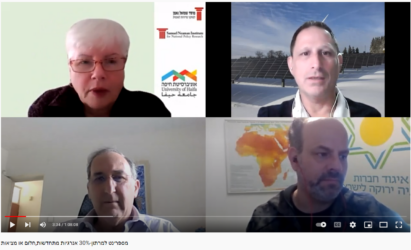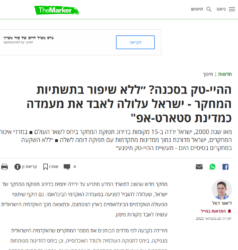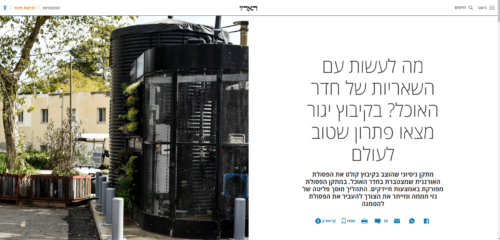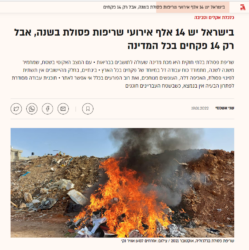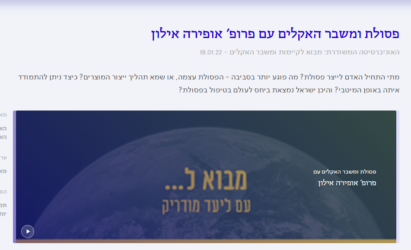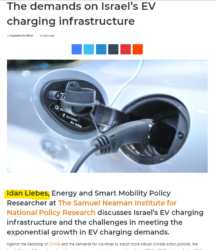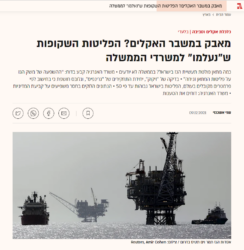Connect to schedule an interview
+972.4.829.2329
Neaman in the media
From sprint to marathon – 30% renewable energies, dream, or reality
Prof. Ofira Ayalon in an expert’s discussion in the field of renewable energy.
Without improvement in research infrastructure, Israel may lose its status as a start-up nation
Ella Barzani, Daphne Getz, Rinat Klein
A new study by the Samuel Neaman Institute team deals with the relative decrease in Israel’s scholarly output..
Leftovers from dining room? Kibbutz Yagur found a solution that is good for the environment
An experimental facility placed in kibbutz Yagur recieves the organic waste that accumulates in the dining room.
The project is in line with the recommendations outlined in a policy document for the treatment of organic waste recently published by Samuel Neaman Institute at the Technion and the University of Haifa. One of the main recommendations of the document is to encourage local waste treatment, rather than a remote central facility.
Link to the full article on Haaretz
Link to the Separation of Organic Waste – at the Source or at a Facility? reserch
From the toilet to the stove: why are we afraid from producing gas from the toilet
New research examined ways to make more people adopt systems for producing cooking gas and fertilizer from human excrement, despite the clearly psychological barrier.
Prof. Ofira Ayalon explains the situation in Israel, and what we need to do to enable wastewater treatment plants to perform better.
Israel has 14,000 waste fires a year, but only 14 inspectors nationwide
Burning illegal waste is a national problem that costs residents’ health. Dealing with this acute situation, worsening from year to year, is a particularly small workforce of inspectors.
Prof. Ofira Ayalon reminds us, that these fires end up with what we breathe, eat and drink.
Waste and the Climate Change with Prof. Ofira Ayalon
Prof. Ofira Ayalon in GALATZ radio station interview: When did man start producing waste? What is more harmful to the environment – the waste itself, or the manufacturing process? How can it be dealt with best? And where is Israel compared to the world in waste management?
The Climate Crisis Has Not Skipped Israel: 2021 Fourth-hottest Year on Record
The Meteorological Service recorded and found that the number of days with rainfall dropped.
When the same amount of rain falls in shorter bursts, more of it is lost rather than absorbed into the groundwater, and there is more flooding and property damage, explained Prof. Ofira Ayalon of Haifa University and the Samuel Neaman Institute for National Policy Research Institute at the Technion.
The demands on Israel’s EV charging infrastructure
Idan Liebes
Idan Liebes, Energy and Smart Mobility Policy Researcher at The Samuel Neaman Institute for National Policy Research, discusses Israel’s EV charging infrastructure and the challenges in meeting the exponential growth in EV charging demands.
Fighting the climate crisis? The transparent emissions that have “disappeared” from the government’s eyes
Ofira Ayalon, Miriam Lev-On, Perry Lev-On, Naama Shapira
How much methane does the gas industry emit in Israel?
The government doesn’t know.
The Ministry of Energy stated in its report: “The impact of the gas sector on methane emissions is negligible”
Contrary to the recommendations of the Samuel Neaman Institute Report, there is no comprehensive and reliable collection of emissions data in Israel.
An interview with Prof. Ofira Ayalon on “KAN”: Managing wastes correctly
An interview with Prof. Ofira Ayalon, Senior Researcher at Samuel Neaman Institute at the Technion, and environmental policy researcher at University of Haifa: On the need for a proper waste management, and better coordination between the Ministry of Environmental Protection and the local authorities

